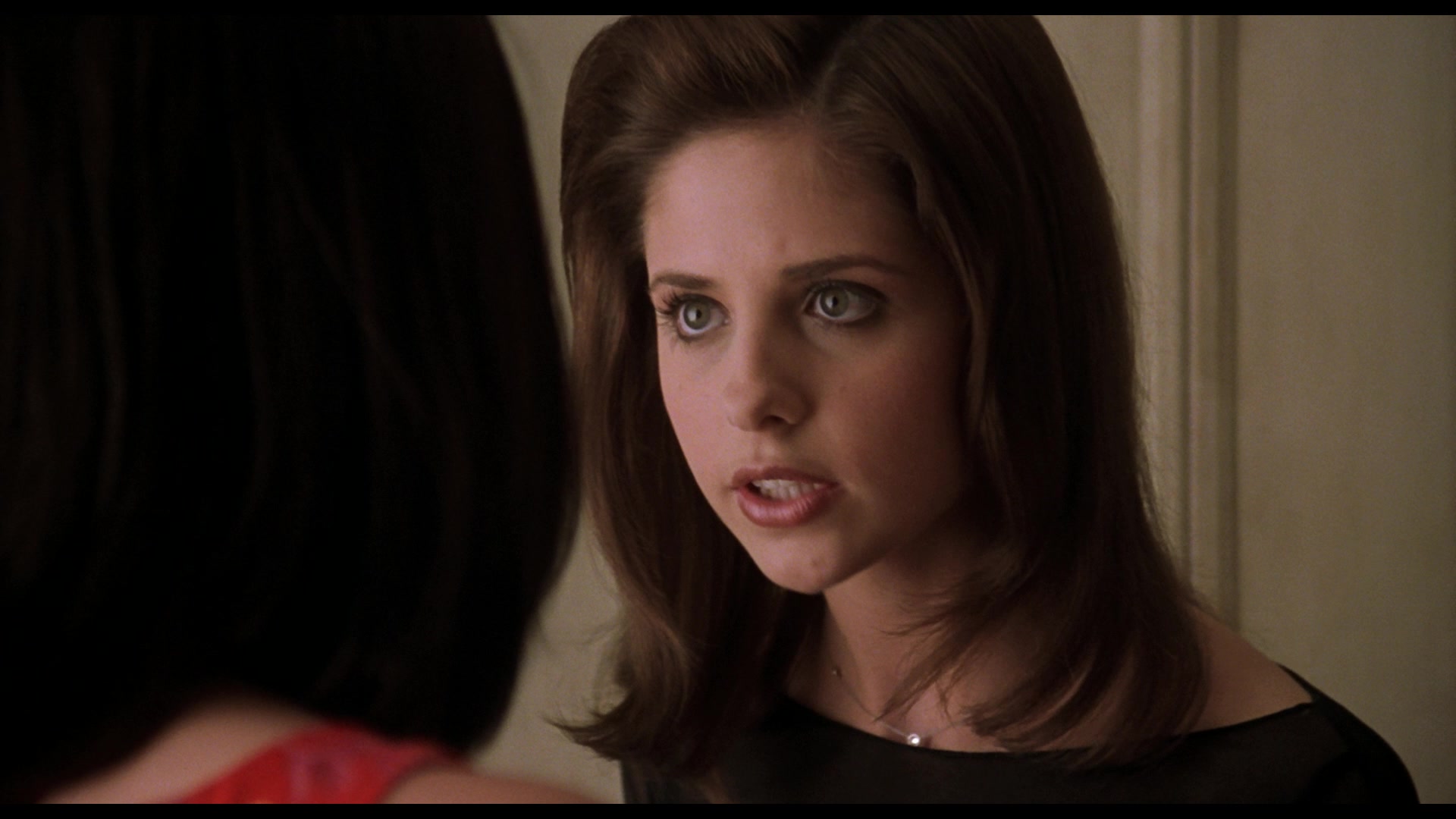A buddy of mine recently asked me what genre do I not see much off these days in need of a comeback. I used to think Westerns, but lately I’m thinking we need a proper return to high school/college noirs…… pretty much any creative use of a school setting to be a noir. There’s just something about high school (at least how I remember my youth) that lends itself to being a microcosm of the real world. But of course, Hollywood thinks it’s only good for coming-of-age at best or romcoms at the very least!
All the Harry Potter movies (2001-2011)

Yeah, I cheated, sue me (you won’t win a lawsuit because I’m a lawyer and I’m right). I just couldn’t single out one HP entry. This might be the most consistent movie franchise of the 21st century (you try making 8 movies with “generally favourable” reception year after year after year). Sure, fans have their favourites and least favourites, but the HP movies continue to be generational. And I think part of why the stories have endured for over two decades, is that Harry Potter has always been mystery thrillers disguised in kids’ books. There is always a central question(s) in each entry informing the plot and characters’ progression:
What is the Philosopher’s Stone and who is after it?
Who opened the chamber of secrets and who is the heir of Slytherin petrifying students?
What is escaped fugitive Sirius Black after in Hogwarts and who are the Marauders?
Who put Harry’s name in the goblet of fire?
What is causing the connection between Harry and Voldemort and what lies in the Department of Mysteries?
Who is the half-blood Prince and who is behind the plot to assassinate Dumbledore?
Where are the remaining horcruxes hidden and what can destroy them?
The formula goes something like this: There’s an inciting mystery; Harry and his pals pick up clues over the span of the academic year; occasional red herrings are peppered throughout; the answers to the mystery are revealed; our heroes defeat an evil and/or save a life; some lessons are learnt. JK’s formula has worked 7 times for her, and all 8 movies have stuck to the core of this Alchemy, forbidden forests, bewitched diaries, petrified students, hate speech written in blood, snake languages, giant serpents that can kill you with just a stare, a family of spiders, wizard fugitives, time travel, prophecies, tampered memories…. it’s all here! This whole franchise is a brilliant application of magic and mystery in a boarding school, and it’s mainly what inspired me to make this list.
Battle Royale (2000)
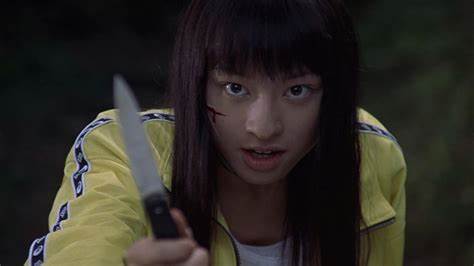
How long can morality stand in the face of hardship? will a normal person discard all societal norms when survival is on the line? Are we all hypocritical? Battle Royale (or BR2000 for short) tackles these lofty themes, merging the high school sub-genre with the dystopian.
When I was a teenager watching BR2000 for the first time, I remember screaming at the top of my lungs, almost as if I had known these characters. I pondered what I would do, if I would have done what I think is right and never killed anyone, or be just like everyone else. I wondered if I would have betrayed my own friends. Maybe I would reject my moral code and maybe show my dark side that I’ve had hidden for so long, I myself would be surprised at it coming out. This film made me realize that right now, even though I want to help as many people as possible, I don’t know who I am or how to help myself.
I don’t think I really deserve the help either, just the fact that I don’t know if deep down I’m a good person or I am absolute chaos, I don’t think I would deserve it. I even showed BR2000 to a friend, and then we did an exercise of who we would kill first in such a situation and I found it fascinating that we both chose the people “closest” to us. It’s amazing who you would let go of if you didn’t have to worry about the fallout next day.
The film may have been lampooning the intergenerational disconnect and youth alienation in late 20th century Japan that’s only worsened today. But to me, it always read as an extremely brutal and dramatized depiction of teenage angst and distrust of adults. Now that I’m older (and gotten past the shock value), I can appreciate BR2000 as satire of the Japanese school system, especially how the high standards win-or-lose system of Japanese schools immediately puts the students into competition with one another. Where one succeeds the other falls, just like on a battlefield. The fact that the kids all randomly receive different weapons could be interpreted as how we are all asked to do the exact same thing (i.e. succeeding studies in a certain way and not any other) while we all have completely different abilities and background, some people being advantaged naturally or thanks to their family. This is even more the case in the Japanese school system and society where being different is really seen as a problem……. but isnt that like, every school in the world.
While there’s no “political intrigue” plot in the film, the filmmakers were definitely commenting on the attitudes of older generations of Japanese to so-called juvenile delinquency, which tended to involve a lot of Japanese elders and baby boomers saying things like “they should just put them all on an island and have them kill each other!” The film strikes back at this authoritarian attitude by humanizing the kids and villainizing the adults. It’s worth noting that the kids don’t, for the most part, do anything worse than be obnoxious to teachers. They aren’t murderers and thieves. They are made into murderers in the film though.
How can a film have so much violence, but at the same time so much love and empathy. To quote Roger Ebert, “We are so accustomed to ‘thrillers’ that exist only as machines for creating diversion that it’s a shock to find a movie in which the action, however violent, makes a statement and has a purpose.”
Brick (2005)

Brick is what everyone wishes their first movie to be. Rian Johnson’s Sundance darling might not be the first high school mystery with teenage sleuthing, but it was the first one I can recall infusing Cowboy Bebop with unbridled glee. Rian Johnson stuck like glue to the lingo of the “hard boiled” novels of a short-lived era. The contrast of the modern high school setting mixed with the lingo of an old detective movie is captivating. The dialogue is classy & poetic against a raw backdrop. Yes, the gumshoe dialogue will divide many, some people weren’t able to get over it, but I find that it compels you to pay rapt attention to what is ensuing. From a filmmaker’s point of view, it’s very smart to use this very specific language because it’s what lets us know we are firmly in Noir territory. It’s just a commercial hard sell— not that I care. While Johnson has a sense of humor with the settings and archetypes, the actors are NEVER winking.
It’s a beautifully shot, well-paced, deliciously acted little film. Johnson knew exactly what he wanted to make and he made it. Nathan Johnson’s (Rian’s brother) score is just unbelievably good, lonely piano and jangling percussion set the tone. When I try to describe it to people to watch, it always comes out flat. It’s almost like a fantasy from the minds of the people in the movie, but it feels so authentic and believable. It’s brilliant with just the perfect balance of tongue-in-cheek, noirish high school angst.
Heathers (1989)
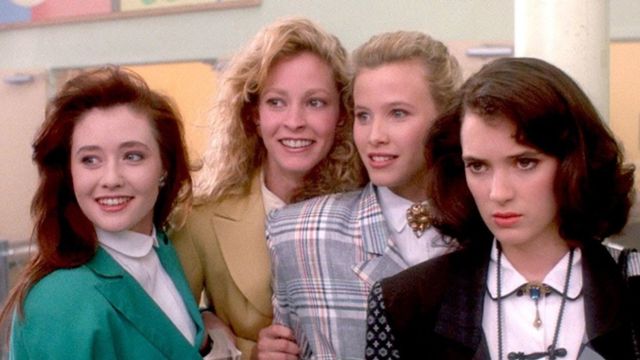
35 years later and director Michael Lehmann’s debut still rocks as a non-traditional film about teen angst. At the peak of 80s excess, Heathers turned things around for the teen movie conventions we were used to. It truly captured the essence of what high school is really like, while poking fun at the John Hughes slate of films at the time. Ultimately it paved the way for fresher comedies of its genre Daniel Waters’ screenplay has enough of a dark cynical edge to make its subject matter subversive, utilizing smart dialogue and some clever black humor. The script had the gumption to allow us to peer through the antagonist. We see the dynamic he thinks from, and we reason with him. Fun fact: Waters envisioned the original script for Heathers as a 3-hour Stanley Kubrick teen movie! He was hoping for Kubrick, a visionary who had done war movies, horror and satire, to make a high school movie! I’m not exactly complaining about what we got from Michael Lehmann……but imagine Stanley directing Christian Slater or Winona Ryder to make a Kubrick stare…. imagine Kubrick satirizing the glorification of teen suicide…. Just imagine what could have been!
You want to see wardrobe tell a story? JDs dominant color is black and Veronica’s dominant color is blue. As JDs power and influence over Veronica grows her clothing becomes a combination of blue and black, and JD begins wearing red under his black coat, which was Heather Chandler’s dominant color implying power. Heather Duke also had her dominant color change from green (envy) to red (power). JD was wearing a red shirt under his black coat when he blackmailed Heather Duke indicating that he now had power over all of them.
In 1989, people really needed to hear that high school can be hell and the only way most people avoid their own suffering is to make others suffer. Clearly this cannot be made in today’s context given all the recent tragedies at learning institutions, but Heathers has endured in part due to its overall message of individuality. School clique satires like Drop Dead Gorgeous, Jawbreaker and Mean Girls do not exist without Heathers.
Mean Girls (2004)
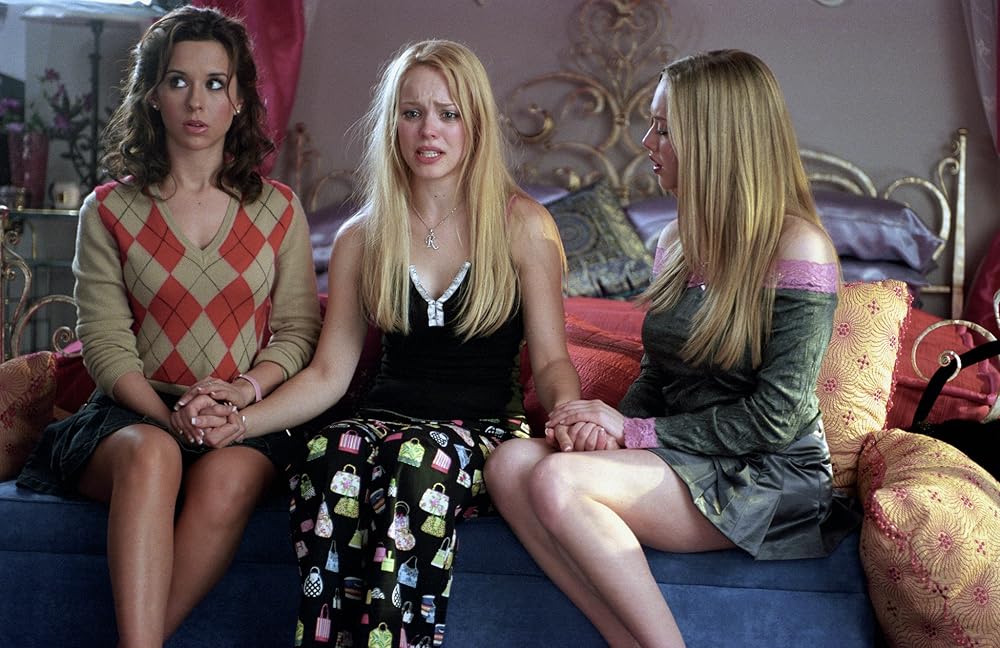
A lot of teen “chick flicks” try too hard to be like movies of the past instead of doing something subversive. They often fail to capture how the inner workings of these cliques can make the girls act incredibly mean towards each other. This is why a classic like Mean Girls is even better once you’ve seen its countless imitators – the high school movies that misunderstood the nuance and subtext of Tina Fey’s screenplay! The whole thing with Mean Girls is how it captured the different cliques and factions in high school, satirizing inter-girl issues, social hierarchies and networks. It was about how some girls use nonsense social rules and psychological warfare on their enemies partly because they’re bored, partly because they were raised in a superficial home.
I recognize The Plastics in my own setting – I knew cliques like that in my high school. Mean Girls explores their psychology better than any modern high school movie I can think of. Girls like these use glitter, glamour, and cunning, but really, they’re miserable inside. A typical mean girl perpetuates this toxic cycle thinking at least in high school she’s on top. These girls think life is all about high school; they think of themselves as these eternal queens whose reign will be forever. It’s the delusion of it that the movie satirizes. Mean Girls shows that at the heart of most “mean girls” is an angry kid with no boundaries or guidance. She is privileged to have everything, yet despises the outcast who has relatively less. The movie argues that girls have to deal with their issues with other girls more honestly. They have to express their anger in more healthy ways (as Tina Fey’s character says). Girls cannot be defined by one trait or clique, and all they’ll be left with is resentment if they don’t find an outlet for all that pent-up female aggression!
Eventually, all our protagonists become “mean”: Lindsay Lohan’s Cady starts off as a naive outcast and gradually gets seduced by the allure of being the new Plastic leader. Even Janis who plants Cady inside the Plastics, is revealed to be as manipulative as her nemesis Regina George (my favourite Rachel McAdams performance). There’s a “mean girl” in all of us; a natural inclination for control over others! Power corrupts and absolute power corrupts absolutely! Watch how Mean Girls 2 grossly misunderstands this nuance – just kidding, don’t! Mean Girls operates no different from a crime drama. Regina and others like her are like smiling assassins. They’re more sinister as they hide under this fake niceness, unlike the exterior machismo of guys. Aggressive boys like the archetypal jock use physical violence, whereas aggressive girls weaponize relationships – exclusions, rumour spreading, etc. Yes, I’m saying Mean Girls is Goodfellas for teens lol!
Mean Girls isn’t high art that you can’t comprehend, it’s just a well told story using the high school setting as a microcosm of our modern world!
Election (1999)
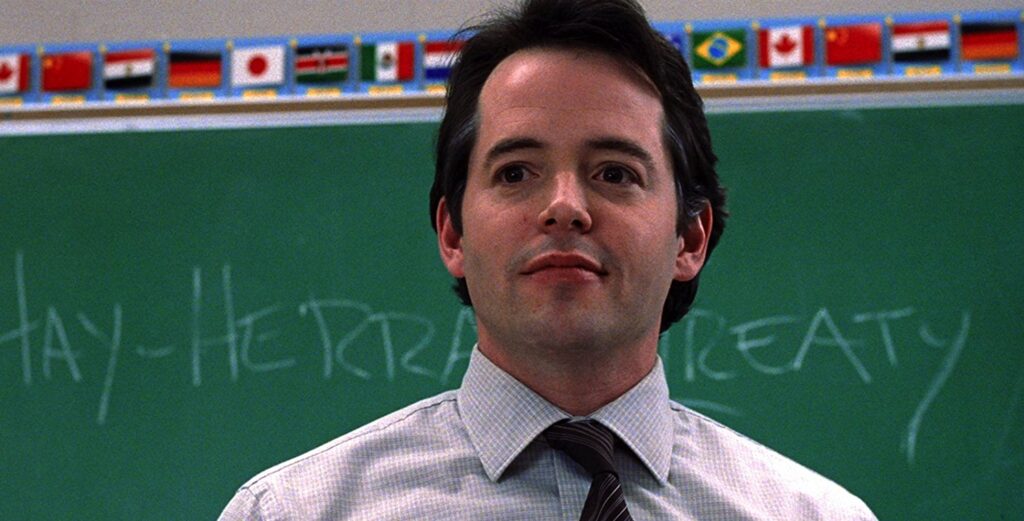
Election is the what I mean when I say “I love political movies.” Director Alexander Payne and co-writer Jim Taylor’s script might still be the definitive word on the cutthroat atmosphere of high school. All the student actors look like actual teenagers, the school is crummy looking and isn’t some glamorous SoCal high school heaven (most high school movies are usually shot at universities), the teachers are plain-looking and flawed, and there is such a real approach to how little of what happens in high school is actually important in a person’s life.
This film was the 2016 US election long before the 2016 US election! The parallels are so eerie when you think about it:
- You have the liberal, goody-two-shoes, career politician (Tracy Flick) linked to a scandalous affair, played wonderfully by Reese Witherspoon (her best role till this day)
- You have the overprivileged, obnoxious, clearly-not-cut-for-statesmanship, frat boy Paul Metzler (your typical Sean William Scott role) who was merely encouraged to run out of petty spite against the politically correct candidate.
- You have the nonconformist, radical candidate Tammy (R.I.P Jessica Campbell) who wants to overthrow the whole ineffective establishment yet ends up being hacked out of the race.
- You have the external power and electoral official Jim McAllister (Matthew Broderick makes you feel his disgust and fear of Witherspoon’s character with a simple look) who is supposed to be impartial yet rigs the race in favour of the least qualified candidate.
One of the genius things about this movie is that it’s told almost completely by the villain’s point of view – and it kind of makes you sympathize with the villain. McAllister is an insecure emasculated man (a running theme in many late ‘ 90s movies interestingly) who cannot stand the mere thought of a future where overqualified women holding positions of power are normalized. Love the completely vacuous rhyme on Metzler’s campaign poster, “Paul Metzler, YOU BET-ZLER!!”. Two exclamation points as well. Election really thought a lot about people who don’t think enough. I don’t think Reese gets enough chances to play weird/neurotic character actor roles. She absolutely nailed this one. Election was the reason she almost didn’t get Legally Blonde; she played this character so well they swore she was like Tracy and “not sexy enough”.
Election is not just another high school comedy but a scathing critique of modern politics where the election process has nothing to do with improving anyone’s lives but becomes a staging ground for egos, petty score settling and careerist vampires. It does a great job at portraying how the once sophisticated and democratic process of election where people used to vote for the best person for the job and questioning ones administration policies has now become a process of voting for the popular kid and the cult following trend. Which has now indeed become a huge part of the election nowadays. Today, people dont look at the policies they just care about who got shot, who held a fist bump up in the air, who is funnier, it’s all about the popular kid now. Sound familiar? Sound like something you see on CNN or FOX?
American Animals (2018)

A brazen docudrama heist film about four students deciding to steal valuable books in a quest to elevate their lives. Not only is this a true story, but the four perpetrators involved in this crazy 2004 thievery appear in interviews intercut with the actors portraying them.
Having enjoyed many heist films, a little part of me always wondered what it would be like to do one. This being a true story, it relayed very well the growing anxiety one would feel if you weren’t a born criminal and decided to do one just for kicks. I felt like so sick when watching the actual heist scene, along with the one where the characters don’t go through with. The movie really puts you in their position, giving you that weird stomach drops of anxiety.
At the end of the day, American Animals an exploration of why group dynamics are so complex and how friend associations can have a strong impact at that age. The trailer may falsely advertise American Animals as some quirky black comedy, but it gets unexpectedly heavy – I’m talking Dostoevsky’s Crime and Punishment levels.
We love these kinds of true crime escapades because they are fascinating and exhilarating, and yet we know it’s wrong to steal… But we lionize the guys that do it, and if me and many other young folks are honest with themselves – we’d do it given the opportunity and the belief we could get away with it. What does that say about our nature and our culture? Like the actual thieves are here getting applauded, are out of prison, are now semi famous, and people see them as winners…. I leave this to the philosophers to ponder over.
Scream (1996)

You know Michael Myers isn’t real. You know Freddy Kreuger isn’t real. You know Jason Vorhees isn’t real. But you know Ghostface is a person in a high school murdering people. That’s why Scream terrified an entire generation. The characters talk about reference Wes Craven horror movies within the text, making the events feel like they are taking place in the audience’s world. The horror is that the killer(s) are horror fans like you, except that they’ve taken their fanaticism to a malicious extreme. Ghostface are just regular people wearing a cheap Halloween costume with little to no visibility and a large robe dragging across the floor. None of these people who take up the mantle are professional killers, just crazies who adapted the persona. It really could be anyone behind that mask, and that’s terrifying.
Having multiple people be the killer is still one of the best horror movie twists ever. t’s the logical thing to do when the identity of the killer is known at the end of the movie and the killer isn’t supernatural. This franchise is clearly about the mystery of who the killer is. You need to have different killers to keep doing that.
To me, Scream is more a suspenseful comedy with an intriguing mystery at its centre. Its Scooby Doo for young adults: a group of quirky teens solving a mystery, with the suspect usually hiding in plain sight, donning a costume while their crime is being committed.
I always get frustrated trying to convey just how many balls Craven and screenwriter Kevin Williamson are able to juggle perfectly in the final act. Scream may not be perfect, but it’s far and away one of the most accomplished slashers because of its many ambitions and how consistently it’s able to hit those notes so well. It helps that the cast is extremely likable, and inhabiting characters of deceptive depth. There’s a lot of wonderfully kinetic camera work and some ridiculously well-considered compositions, and the editing is deceptively meticulous.
On top of that, Sidney is kind of a secret weapon of a protagonist, and her inversion of final girl tropes as well as seeing that level of something approaching sensitivity for a woman in a mire of trauma in a slasher is really refreshing to this day. She’s an easy principal character to root for, and the supporting cast evokes similar pangs of empathy from me. Tatum’s final stand is hilarious, but it’s also really heartbreaking to see its conclusion because the film makes her so likeable. Gale is unapologetically career minded and kind of vile, but there’s something dementedly admirable about her particular kind of pluck, and she reads as more than a simple weather pun on screen.
In hindsight, the murdering duo remind me a LOT of the dynamic between the two Columbine boys. One was very much the follower in the relationship while the other was a stone-cold psychopath. Scream came out just three years too early……
Better Luck Tomorrow (2003)

Better Luck Tomorrow, a startling and still relevant portrait that subverts and deconstructs the Asian American “model minority” myth. Justin Lin’s debut was a snapshot of early 2000s youth culture with something to say amidst all the American Pies of its time. Even today it can still be seen as an exploration of what being a young person feels like. It never feels like a vector for the idealized and unresolved teenage angst of stunted adults (coughs Euphoria). What could have been stereotypically “Crazy Rich Asian Teens”, instead has genuine insight and human revelations. None of that vapid overdramatic “Tumblr depth” you get from teen shows today (sneezes Euphoria). Lin’s work never comforts his audience with the self-indulgent impulses that most adults nowadays are incentivized to wallow in. The dialogue feels like a peek into real people’s lives. You can tell Lin understands and has actual empathy for his characters. There’s a difference between capturing teen angst and fetishizing it (whispers Sam Levinson).
You get actual consequences and jeopardy. Lin doesn’t hold back on the dark side; yet it never feels like self-serving, exploitative, pornographic nihilism on display (burps Harmony Korine). In short, Better Luck Tomorrow is a brilliant uncompromising vision from a fresh director with a lot of promise! So much promise that he would go on to make the best entries of a certain fast and furious franchise.
Assassination of a High School President (2008)
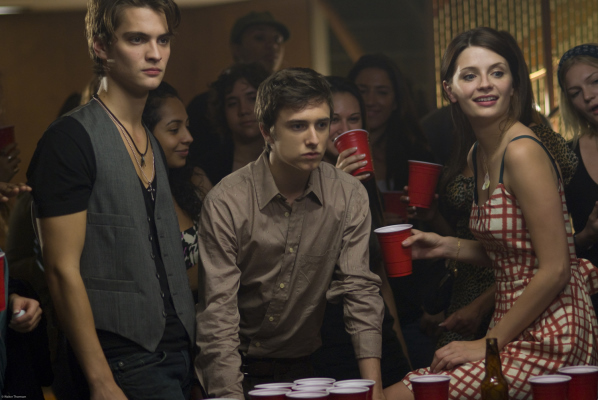
A bunch of SAT exams are stolen from a high school principal’s (Bruce Willis) office. Our protagonist (Reece Thompson) is the school paper journalist who suspects the school president is the thief. He publishes an exposé that pretty much ruins the president’s life. However, as our journalist gets to know the president’s girlfriend (Mischa Barton), he begins to have complicated feelings for her and second thoughts as to the real culprit(s?).
Basically, this is a detective noir for young adults but is set in a New Jersey Catholic school: Bobby Funke (Thompson) is a sophomore journalist beset by a lot of the typical teen perils — school bullies, an overbearing Spanish teacher (Josh Pais never disappoints), a tyrannical principal (Willis) and, of course, the first stirrings of love and lust by a femme fatale (Barton). All the tropes are here, down to the sardonic detective narration!
The opening scenes have a lot of raunchy interchanges that may give off Judd Apatow vibes (Superbad had just come out a year ago and is arguably the decade-defining high school movie). But Assassination has more loftier and inspired goals than that, with influences as far back as Chinatown (the last line is a gratuitous yet tongue-in-cheek homage where someone tells Bobby “Forget it Funke it’s high school”).
Reece Thompson demonstrates the same ease and charm here as journalist Bobby Funke (he reminds everyone it’s pronounced “Funk” with a silent “E”). Not many young actors convey intelligence, but Thompson is completely convincing and immensely likable as an aspiring journalist who wants to expose the truth about the school’s top jock.
As the prom queen who takes him under her wing, Mischa Barton gives a captivating performance. There’s something very hypnotic about her eyes; and it certainly helps that she’s taller than Funke – really visualizes the lopsided dynamic both share in the narrative. These two actors have wonderful chemistry that makes the movie – they nail exactly what the material demands of them!
Bruce Willis seems to be having more fun with his principal role – maybe the last genuine fun he ever had as an ageing actor! Seriously watch it at least for any of the scenes he’s in! Gosh I wish the man had played more comedic roles in his prime! The film runs a tight 90 minutes, so at least it doesn’t wear out its welcome. The song selections are smart and personally nostalgic for anyone into post-punk/indie rock of that decade. Brett Simons must be credited with an energetic spin on a lot of tired tropes. The script by Tim Caplan and Kevin Jakubowski veers from genuine wit to high jinks with near-perfect balance. Again, it’s a noir so you could find a lot of things a bit cookie cutter, but the film isn’t trying to overthink itself or smell its own farts. You’ll be having a stupid grin the entire run-time, especially if film noir is your thing!
Cruel Intentions (1999)
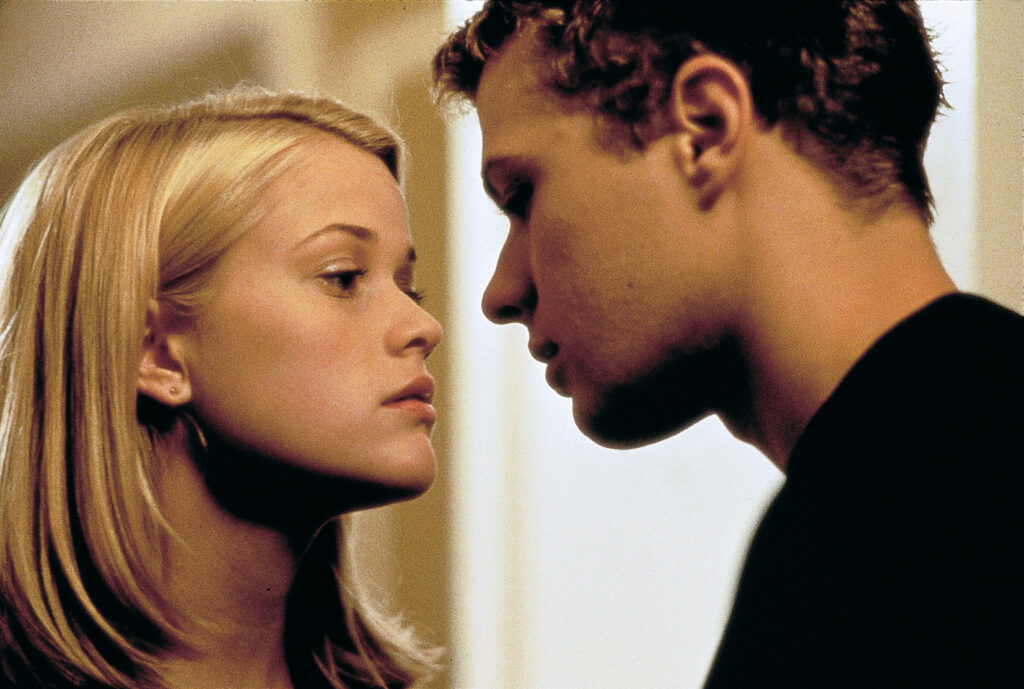
Sarah Michelle Gellar had such a chokehold on pop culture in the late 90’s and early 00’s with her iconic characters. Can you believe she missed out on the role of Juliet in Romeo + Juliet because she was overbooked? Hollywood of that era didn’t know what to do with her once she aged out of the teen icon bracket. Which is our loss, coz she had range like a rover! Sarah absolutely slayed as Kathryn, considering that she’s mostly known for playing protagonists – to me it was like Denzel switching to a bent copper in Training Day!
The story of bored upper crust step-siblings Kathryn and Sebastian (Ryan Phillipe) making a dangerous wager of seduction and deception, immediately stood out from the American Pie, She’s All That & 10 Things I Hate About You of 1999! It was a peek into high society through a teen movie lens.
It oddly showed respect for the intelligence of its demographic being fed gross-out humour and bubblegum schmaltz at that time! An exploration of the dark underbelly of teenage life and how weighty expectations and boredom can lead to social aggression. Not a gaudy, tumblr-written “ooohhh let’s watch fucked up kids do fucked up things” by Sam Levinson!
SMG is who Emma Roberts has tried desperately to be – the “fetch” that never quite happened and never will! Kathryn flirts between the roles of seductress, good girl, damsel in distress for the benefit of the men in her life, all while raging inside and not fully embracing who she is or has the potential to be. She is a tragic broken person with false confidence – not feminist at all. She is a woman conforming to a culture that she despises, and in turn, despising herself for conforming. Her deep desire to succeed within this culture—one that tells her not to be too slutty, but not to be too prudish—can perhaps best be summed up with the first line she utters: “I’ll do my best.”
This should have been called Cool Intentions: Kathyrn’s hair, make up, clothes, the way she spoke, was the pinnacle of turn-of-the-millennium ivy league chic. No offense to today’s young actors but what’s so great about Cruel Intentions is that all of the actors have effortless panache. Katherine never lose her cold bitch attitude, Sebastian literally switch from asshole to lover (which I’m still mixed on but my point stands) but when I watch today’s teen movie or series, I don’t particularly find many of them believable or strong in their character.
I can see this movie being outdated to many by today’s standards at least in western society. Back then it was a perfect reflection of how women and men were viewed. We’ve come a long way. Katheryn is smiling, wherever she is. She won…..or did she? With the trendiness of #MeToo and #RedPill, I’m unsure if Kathryn wouldn’t be considered the ultimate villain in today’s society. All I know is no high school movie in the last 25 years has quite the Midas touch of ending with Bittersweet Symphony by The Verve!
Veronica Mars (the TV series:2004-2007 and the 2014 movie)

There’s an old joke that Veronica Mars walked so Riverdale could- well, like, crawl weakly out of a storm drain, covered in mud and shit and then immediately get hit by a truck and driven around for three miles. The dark teen noir concept has become popular these days, but what sets Veronica Mars apart from them, is that it actually has good writing, phenomenal casting and fantastic humour weaved through the drama. It has everything I want: mystery, a cute father-daughter relationship, humor, overcoming racism and classism, and grade A acting.
Veronica is a modern-day Nancy Drew who’s the smartest one in any room and who takes no shit from anyone. She’s not egotistical so much as she’s confident in her skills. The first season of Veronica Mars really is a classic. The 2nd season maintained the consistency in quality. Alas the third was a little convoluted and went off the rails because they knew the show was losing viewership and were trying to save it but the filmmakers went about it in a really bad way.
Then the 2014 movie happened, which was pretty good, a fanservice-y film that was very enjoyable. Set nine years after the events of the third season, the plot follows Veronica Mars returning to her hometown in Neptune to investigate the death of a former classmate allegedly murdered by Mars’ ex-boyfriend. This is very inviting to first-time viewers, seamlessly blending great performances, fun screen chemistry, some self-referential humor, an intriguing (albeit sometimes a bit far-fetched) story, and thrills that are legitimately thrilling thrills. From a movie perspective, it starts off a bit rocky, but it finds its legs quick enough and makes you have fun regardless of your familiarity with the source material. Kristen Bell is such a pleasure to watch: she’s funny, charming, and badass, and there are some randomly hilarious cameos. The direction is swift and judging from the shrieking from fans in the theater, this very much kept the spirit of the television series.
The movie does feel like a really elaborate two-hour tv episode, but I don’t think it was bad for that. It was what I wanted. The characters had changed in natural ways. The mysteries felt like they belonged in the world the show had created. The show always had noir overtones, and they continued that. I was worried that non show fans might not be into it, because it does revisit a lot of its own continuity and in jokes. I am pleased with the final product, and I would be interested to see them do a series of low budget movies in the new status quo they set up. They clearly left dangling threads to be solved later.

Chaitanya Tuteja is someone who enjoys sharing his thoughts on books, movies, and shows. Based in India, he appreciates exploring different stories and offering honest reflections. When not reflecting on his favorite media, Chaitanya enjoys discovering new ideas and embracing life’s simple moments.

